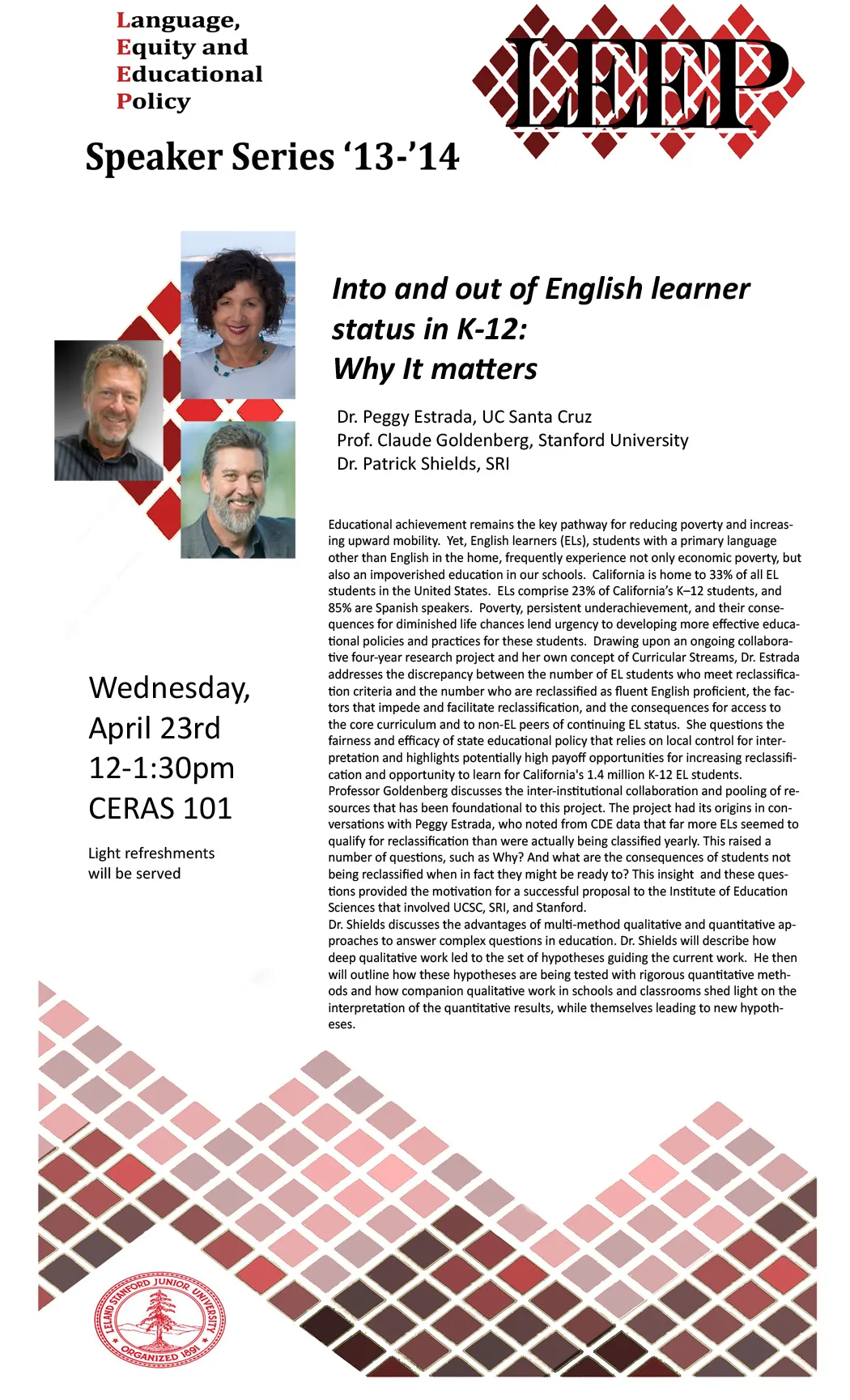
LEEP conference: Into and out of English learner status in K-12: Why It matters
Educational achievement remains the key pathway for reducing poverty and increasing upward mobility. Yet, English learners (ELs), students with a primary language other than English in the home, frequently experience not only economic poverty, but also an impoverished education in our schools. California is home to 33% of all EL students in the United States. ELs comprise 23% of California’s K–12 students, and 85% are Spanish speakers. Poverty, persistent underachievement, and their consequences for diminished life chances lend urgency to developing more effective educational policies and practices for these students. Drawing upon an ongoing collaborative four-year research project and her own concept of Curricular Streams, Dr. Estrada addresses the discrepancy between the number of EL students who meet reclassification criteria and the number who are reclassified as fluent English proficient, the factors that impede and facilitate reclassification, and the consequences for access to the core curriculum and to non-EL peers of continuing EL status. She questions the fairness and efficacy of state educational policy that relies on local control for interpretation and highlights potentially high payoff opportunities for increasing reclassification and opportunity to learn for California's 1.4 million K-12 EL students.
Professor Goldenberg discusses the inter-institutional collaboration and pooling of resources that has been foundational to this project. The project had its origins in conversations with Peggy Estrada, who noted from CDE data that far more ELs seemed to qualify for reclassification than were actually being classified yearly. This raised a number of questions, such as Why? And what are the consequences of students not being reclassified when in fact they might be ready to? This insight and these questions provided the motivation for a successful proposal to the Institute of Education Sciences that involved UCSC, SRI, and Stanford.
Dr. Shields discusses the advantages of multi-method qualitative and quantitative approaches to answer complex questions in education. Dr. Shields will describe how deep qualitative work led to the set of hypotheses guiding the current work. He then will outline how these hypotheses are being tested with rigorous quantitative methods and how companion qualitative work in schools and classrooms shed light on the interpretation of the quantitative results, while themselves leading to new hypotheses.
Peggy Estrada is Faculty Associate Research Scientist in the Latin American and Latino Studies Department at the University of California, Santa Cruz. Her current research addresses English-learner linguistic, instructional, and curricular policies and practices and their consequences for core curricular access, achievement, and integration with non-English learner peers. Her publications include "English Learner Curricular Streams in Four Middle Schools: Triage in the Trenches," a forthcoming article in The Urban Review, and Teaching Transformed, which integrates sociocultural theory, research, and pedagogical and classroom organizational guidelines for designing instruction that can achieve excellence, fairness, inclusion, and harmony. She is also producer of Engaging Students in Reading Comprehension Using Instructional Conversation, a 2004 documentary video that illustrates key pedagogical principles. Other research has focused on pedagogy, instructional quality, and achievement in culturally and linguistically diverse classrooms and teacher-student and peer relationships and their impact on achievement and social development. A native of California and second-generation American, Dr. Estrada is a former preschool and public school teacher.
Claude Goldenberg is professor and chair of CTE in the GSE. His research focuses on literacy development and academic achievement among English learners. His most recent publications include reviews of the research on improving academic achievement for ELs, which appeared in the summer issue of American Educator and a study of phonemic awareness instruction for children learning to read in Spanish, forthcoming in the American Educational Research Journal.
Patrick M. Shields, Ph.D., executive director of SRI Education, conducts research on effective educational policies for economically poor and ethnically diverse populations. In addition to his work on this project focused on ELs, he is principal investigator of two, multiyear evaluations of the National Science Foundation’s investments in informal science education. He also is co-principal investigator of the Science Activation Learning Lab, a national research and development consortium dedicated to activating youth’s interest in STEM careers.
